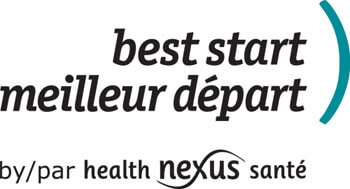| 11 | 12-15 months | Language and numbers | Did you know babies quickly gain an understanding of the world around them through the development of language? |
There are times when your baby’s brain is ready to develop certain skills. Language skills need to be put in place as early as possible.
- There is a window of opportunity for learning to talk between one and two years of age. Speech continues to develop for many years.
- Talk together often. Use new words to point out objects, people and interesting things. Talk about what you are doing and about the places you are visiting together.
- Repeat key words slowly, separating the syllables of the longer words that may be new: grand-ma, di-no-saur, ti-ger, etc.
- Give your baby the opportunity to respond to what you are saying and respond back to your baby. Your baby will learn that communication is done back and forth. Encourage your baby’s reactions and questions with engaging answers.
- Read books to your baby from an early age. Read with enthusiasm in your voice and in your facial expression. Rather than simply reading the story, add to the reading experience. Ask your baby questions about the story or pictures. Encourage your baby to think about words and objects. You will be setting up important connections in your baby’s brain that will help with talking and reading skills later on.
- Sing songs and rhymes that have repetitions in them. Do the actions mentioned in the songs. Encourage your baby to be involved in the song. Emphasize the words that rhyme.
- Speak to your baby in the language you are most comfortable with. Babies can learn more than one language if they hear them regularly.
- If you cannot access books in your home language, talk to your baby using photo albums, magazines or books in any language. As you flip through the pictures, describe what you see, or make up a story in your own language.
- Visit your library and choose books that have pictures of things your baby is interested in (animals, trucks, trains, machines, etc.).
Math skills can also be developed well before school starts:
- Games that include stacking, sorting and counting are a good way to start. These games will help your baby learn how to solve problems.
- Talk about the things that are the same and those that are different. These can be in sizes, colors, textures, etc.
- Songs and rhymes with numbers are a fun way to learn as well, such as “Ten little monkeys jumping on the bed”. These will help your baby understand numbers and counting, so that math skills will be easier to learn later on.
If you think your baby may have a delay in their development, talk to your health care provider as soon as possible. This could have an impact on future learning because skills build on each other.
